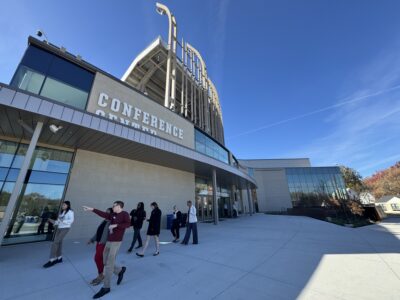Regents to begin discussion about tenure review, workload requirements for professors
Legislators have said they may change tenure law if Regents don't

photo by: Shawn Valverde/Special to the Journal-World
The University of Kansas campus is pictured in this September 2023 aerial photo.
Tenured faculty members at the University of Kansas would get reviewed more often and might have to teach more classes under a set of proposals that the state’s higher education leaders soon will review.
With several state lawmakers saying they have concerns about the current tenure system at universities, the Kansas Board of Regents next week will have a discussion about changing the tenure system for all public universities in the state, and also will review workload requirements for professors.
The potential policy changes aren’t up for an actual vote at Wednesday’s Regents meeting, according to the agenda, but a vote may be coming in the near future because Regents are sensing lawmakers will act if they don’t.
“That is kind of our charge right now from the state,” Regent Pamela Ammar said at a recent sub commmittee meeting of the Board of Regents. “I want to make sure we do the best we can so we don’t have state intervention, and we can preserve tenure.”
Tenure — an academic rank earned after faculty members reach certain thresholds of research and other academic achievements — has become a political hot button in many states as higher education systems have faced greater scrutiny. The rank of a tenured professor has long come with a lot of job protection. Generally, it is difficult to fire a tenured professor unless a rigorous process is undertaken. The tenure rank also has served as an effective shield against getting fired for saying something unpopular, which can be a danger for an academic who feels the need to test boundaries in order to expand them.
At their meeting next week, the Regents will be presented with a number of proposed policy changes for discussion. They include:
• Tenured professors would face an extensive review by a committee of peers every five years. Currently at KU, such a review generally happens every seven years. The proposed policy also stipulates the review committee would be comprised of five individuals, and at least two of the members must be from outside the department of the professor.
• Faculty members at a research institution like KU generally would be expected to spend 40% to 55% of their time teaching classes, with the rest spent on research projects and other service projects that further the university’s mission. Faculty members at smaller universities that aren’t major research institutions would be expected to spend 60% to 75% of their time teaching classes.
KU’s current workload policy states that the general expectation for KU faculty members is that 40% of their time be spent teaching classes, with the remainder devoted to research and service. However, KU has a process where professors can seek an exemption — sometimes for multiple years — from that requirement. That process allows for some faculty members — especially those involved in significant research projects — to spend significantly less than 40% of their time on classroom instruction.
From the memo presented to the Regents, it is unclear how much discretion universities would have to grant exceptions below the 40% level. The memo states there could be exceptions for “clinical, research, library and extension roles,” but doesn’t go into any specifics about what type of exceptions would be allowed. That list of exceptions also created some pushback in the sub-committee meeting, and created questions of whether such a list of exceptions would meet the expectations of legislators.
“With all the exceptions to the rule, it makes it very murky,” said Ammar, who is one of two new Regents appointed by Gov. Laura Kelly. “My biggest concern is that we could do all this work, and it is a lot of work, but have we strengthened it at all?”
Several provosts of the state’s public universities lobbied during the recent Regents sub-committee meeting that universities administrators should have some flexibility in granting exceptions. They noted that some professors generate large amounts of revenue through research grants, and it makes sense to have them teach less so that they can meet the requirements of getting those grants renewed, for example.
• Each university would be required to create annual reports showing the number of faculty members who had been awarded tenure during the year, the number who were rejected for tenure, and the number of tenured professors who had left the university, among other data. Additionally, every two years, universities would be required to produce a report showing various data about the faculty related to credit hour production, graduation rates, student retention, research funding, and other such metrics. Both reports would be submitted to the Regents or the office of the Board of Regents, and would be available for lawmakers and the public to review.
KU Provost Barbara Bichelmeyer told the Regents subcommittee that those reports would be some of the most important changes to the system because they could be used to show lawmakers that faculty members are producing positive results.
“We can generate a report every year that shows the Legislature that our people are working hard,” Bichelmeyer said.
Regents will meet at 3 p.m. on Wednesday via a virtual meeting that can be watched on the Board of Regents’ YouTube channel.




